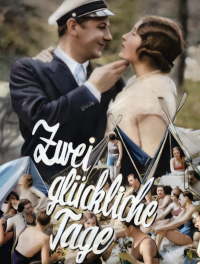
Original Title: Zwei glückliche Tage. Farce 1932; 77 min.; Director: Rudolf Walther-Fein; Cast: Jakob Tiedtke, Ida Wüst, Claire Rommer, Max Gülstorff, Senta Söneland, Paul Hörbiger, Ernst Pröckl, Oskar Sima, Dorothea Thiess, Käte Haack; Aafa-Tobis.
The happy days are those of moving into a forest villa – after escaping the noisy city apartment – and those of moving out. In between, there are days of annoyance for a retiree, even in the new home. Alongside a love story between his daughter and the son of the most hated neighbor, they form the main content of the plot.
Summary
“The happiest day of my life!” That’s what Friedrich thinks as he finally leaves the city with his wife and daughter to move into their newly built villa in the idyllic countryside. The inconveniences of their city apartment had become unbearable, especially due to the old Freisinger, the owner of a café-restaurant, who made Friedrich’s life difficult. From early afternoon until late at night, they were forced to endure music, alternating between Richard Wagner and the latest Rumba hits. One’s patience can certainly wear thin. And if that weren’t enough, the son of that scoundrel from America returns and has the audacity to court Else, his dear little daughter. But now, finally, they can leave all those troubles behind. Peace and tranquility await them, and Friedrich hopes that many happy days will follow this first one.
Disappointed hopes! From the moment the family, including old Uncle Lüftchen, arrives at the villa, discomfort sets in. Nothing seems to work properly. The electrical wiring is faulty, the heating doesn’t function, and the alarm system goes off at the wrong time. Cats are mistaken for burglars, and the fire brigade is mistakenly called. Even at night, misfortunes continuously occur, shattering the well-deserved and long-awaited peace. To make matters worse, the universally disliked and perpetually offended Aunt Ottilie suddenly appears, making herself a permanent guest in the villa.
The only one who still feels comfortable despite it all is the charming Else. Every day, she goes down to the lake to meet Pepi Freisinger and speed across the water in his stylish motorboat. However, even this idyll comes to an end when Friedrich catches the couple in the act. Angered by this, the father forbids Else from having any further rendezvous with the son of his worst enemy. And when Pepi even asks for Else’s hand in marriage, Friedrich has no choice but to unceremoniously kick the cheeky fellow out.
Meanwhile, the situation in the villa becomes increasingly unbearable. Aunt Ottilie constantly argues with the housemaid and invites guests who disregard all rules of etiquette and morality.
The situation worsens even more when Friedrich learns that his enemy Freisinger plans to open a garden restaurant with an amusement park right next to his property. That’s the last straw. He decides to sell the villa and move back to the city. It doesn’t matter that Pepi Freisinger happens to be the buyer of his villa or that Pepi insists on the condition of marrying Else. Friedrich yearns for peace. And he thinks, “my happiest day,” as he finally leaves the place of his greatest disappointments with all his belongings.
-s.’ review in Film Kurier No. 194 (August 18, 1932)
The audience bursts into laughter during this raucous farce, written by Franz Rauch and Rudolf Walther-Fein based on the comedy by Kadelburg and Schönthan.
Kadelburg and Schönthan have attempted to surpass the accumulation of gags from old times, hastily bringing in many stale jokes to fill the gaps (without being too selective—the Mosel wine must remain for obligatory night strolls, and the aunt in her nightgown is a stable prop).
Those two happy days are, of course, not measured by the duration of an hour of love with you; rather, they are those blissful moments when one becomes a homeowner and promptly sells their countryside-dwelling plagued by rural noise.
Rudolf Walter-Fein, as the director and author, has skilfully arranged the comedic situations: the uncle hanging from the chandelier, the hothead falling into a swarm of bees.
They have also made an effort to bring in the seasoned actors who are adept at traversing through all the comical moments: Jacob Tiedtke plays a roundish nuisance, Ida Wüst, Senta Söneland, Oskar Sima, Max Gülstorff, Hugo Fischer-Koppe, Hermann Picha, Paul Morgan.
With natural charm, Claire Rommer portrays the role of Julia in this Kadelburg play of feuding households, while Paul Hörbiger amusingly portrays her Viennese-speaking Romeo. In her delightful refinement, she adds a different touch to the crude tone of this farcical world. Meanwhile, Käthe Haack maintains the heart affairs of the kitchen maid with great liveliness.
Seeber and H. von Kaweczinski were behind the camera; Jack Rotmil and E. Hasler constructed the sets. Under Fritz Goldschmidt’s musical direction, the hit song “Zwei Treppen links” by Marbot and Reisfeld is heard.